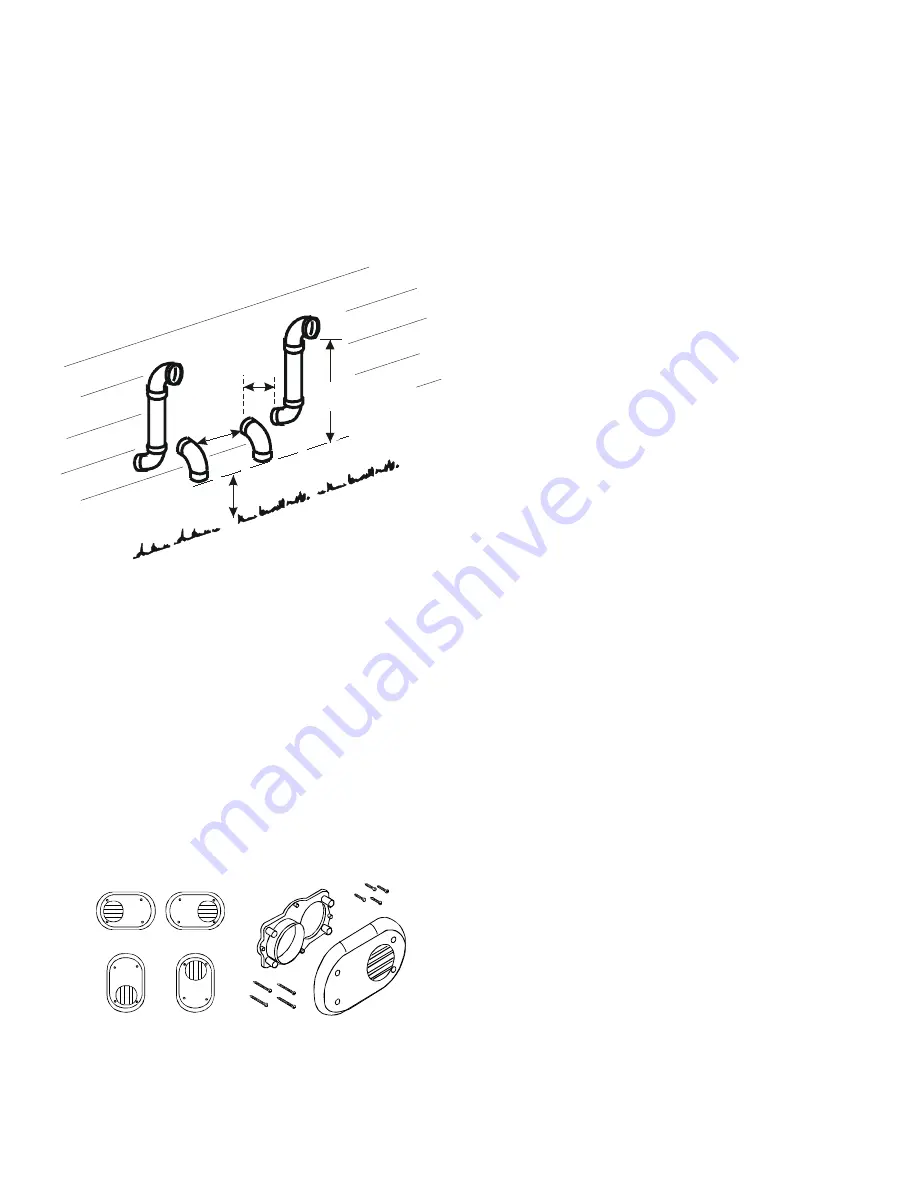
17
Vent/Intake Terminations For Installation of
Multiple Direct Vent Furnaces
If more than one direct vent furnace is to be installed
vertically through a common roof top, maintain the same
minimum clearances between the exhaust vent and air
intake terminations of adjacent units as with the exhaust
vent and air intake terminations of a single unit.
If more than one direct vent furnace is to be installed
horizontally through a common side wall, maintain the
clearances as in the following figure. Always terminate all
exhaust vent outlets at the same elevation and always
terminate all air intakes at the same elevation.
3” MIN
12” MIN TO GRADE OR HIGHEST
ANTICIPATED SNOW LEVEL
12” MIN SEPARATION
3”MIN
24”MAX
Termination of Multiple Direct Vent Furnaces
Figure 22
Concentric Vent Termination
Refer to the directions provided with the Concentric Vent
Kit or IO-619 for installation specifications.
Side Wall Vent Kit
This kit is to be used with 2” or 3” direct vent systems. The
vent kit must terminate outside the structure and may be
installed with the intake and exhaust pipes located side-
by-side or with one pipe above the other. These kits are
NOT
intended for use with single pipe (non-direct vent)
installations.
Refer to the directions furnished with the Side Wall
Vent Kit (p/n 0170K00000S or 0170K00001S) for
installation specifications.
Ve rtica l Installation
H orizontal Installation
Side Wall Vent Kit
Figure 23
CONDENSATE DRAIN LINES & DRAIN
TRAP
A condensing gas furnace achieves its high level
of efficiency by extracting heat from the products of
combustion to the point where condensation takes place.
The condensate must be collected in the furnace drain trap
and routed to an appropriate drain location in compliance
with local and national codes.
Follow the bullets listed below when installing the drain
system. Refer to the following sections for specific details
concerning furnace drain trap installation and drain hose
hook ups.
•
The drain trap supplied with the furnace must be
used.
•
The drain trap must be primed at time of installation.
•
The drain line between furnace and drain location
must meet local and national codes.
•
The drain line between furnace and drain location
must maintain a 1/4 inch per foot downward slope
toward the drain.
•
Do not trap the drain line in any other location than at
the drain trap supplied with the furnace.
•
If the drain line is routed through an area which may
see temperatures near or below freezing, precautions
must be taken to prevent condensate from freezing
within the drain line.
•
If an air conditioning coil is installed with the furnace,
a common drain may be used. An open tee must
be installed in the drain line, to relieve positive air
pressure from the coil’s plenum. This is necessary
to prohibit any interference with the function of the
furnace’s drain trap.
General Drain Information
All furnace models come with a factory installed drain trap.
For vertical installations, the trap will remain in the factory
position. All furnace models installed horizontally require
the trap to be relocated. Many drain hoses have a built–in
grommet which will provide a cabinet seal when installed.
See instructions below for your model and installation
position.
NOTE: Both sides of the drain trap must be primed
prior to initial furnace start up.
Field Supplied Drain
Drain the furnace and air conditioning coil if applicable,
in compliance with code requirements. In horizontal
installations, a field installed rubber coupling will allow
the drain trap to be removed for cleaning. The drain trap
must be primed before initial furnace start up. When an air
conditioning coil drain is connected to the field supplied
furnace drain, it must be vented with an open tee installed
at a height no higher than the bottom of the furnace
collector box to prevent air conditioning condensate from
backing up into the furnace if the common drain became
blocked.
















































